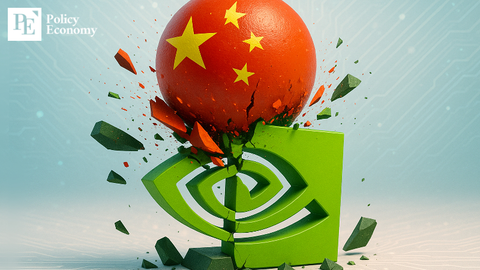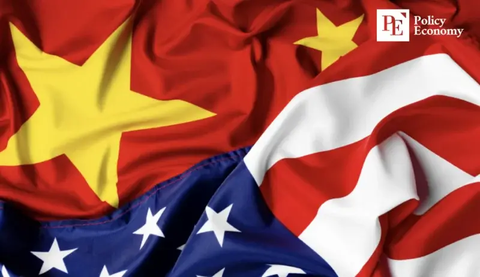Escalating US-EU Trade War: Economic Consequences, Industry Fallout, and the Uncertain Future of Transatlantic Relations
Input
Modified
Spirits and Automobiles: The Industries Caught in the Crossfire Escalating Tensions: Trump’s Unpredictable Trade Tactics The Future of Transatlantic Trade: Diplomacy or Economic War?
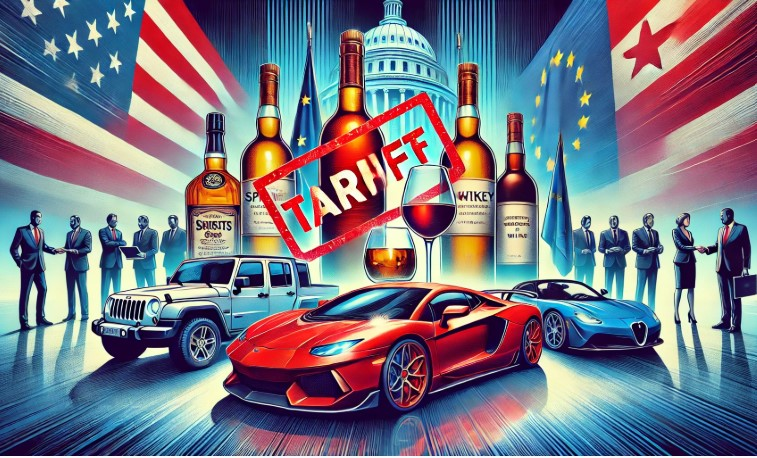
Spirits and Automobiles: The Industries Caught in the Crossfire
The ongoing trade war between the United States and the European Union has intensified, sparking concerns about economic stability and industry fallout on both sides of the Atlantic. At the heart of this dispute is the exchange of tariffs, which has led to retaliatory measures that could have long-term consequences for key industries such as spirits, automobiles, and manufacturing. The European Commission's recent decision to impose €26 billion ($28 billion) in tariffs on U.S. goods came in response to the Trump administration's imposition of 25% tariffs on global steel and aluminum imports. The move has been met with criticism, with former EU Trade Commissioner Cecilia Malmström warning that such actions amount to an escalating conflict with no real winners. Tariffs harm consumers, increase inflation, raise prices, and negatively impact job creation and economic growth. She dismisses the notion that tariffs will create a golden age for the American economy as an illusion supported only by a small group of advisors close to Trump, while the majority of economists worldwide view tariffs as counterproductive.
French Prime Minister François Bayrou has raised concerns about the European Commission's decision to impose tariffs on American bourbon, questioning whether the choice was made without proper consideration. He suggests that the Commission reused an outdated list of products for its counter-tariffs, inadvertently provoking Trump to retaliate with a threat of imposing a 200% tariff on European alcoholic beverages, including wine, champagne, and cognac. Bayrou fears that such actions could have severe consequences for France's cognac industry, which is already suffering from a separate trade dispute between the EU and China. Beijing's recent trade probe into European brandy imports, initiated in response to EU tariffs on Chinese electric vehicles, has placed significant economic pressure on French cognac producers, who now face challenges from both the U.S. and China. Bayrou has urged for diplomatic discussions with Washington and Beijing to find a resolution to these trade disputes and protect European exporters from escalating tariffs.
The impact of a 200% tariff on European alcohol is expected to be severe, particularly for leading spirits producers. Analysts warn that such a measure could effectively wipe out global profits for major companies such as Rémy Cointreau, which derives a third of its global sales from the U.S. Other prominent firms, including Pernod Ricard, Davide Campari, and LVMH, have already seen their stock prices decline following Trump's comments. Financial analysts believe that investors may not be fully grasping the seriousness of the proposed tariffs, given their unprecedented magnitude. Unlike beer, which is typically produced and consumed locally, luxury spirits such as champagne and cognac are highly dependent on their regional origins and cannot be easily relocated to avoid tariffs. This leaves European spirits producers particularly vulnerable to trade disruptions and economic instability.
While the spirits industry faces a potential crisis, the beer industry appears to be one of the few beneficiaries of the ongoing trade war. AB InBev, the world's largest brewer and owner of brands such as Budweiser, Corona, and Stella Artois, expects minimal impact from tariffs since most of its production is already based in the U.S. Heineken CEO Dolf van den Brink has also downplayed the risks, suggesting that tariffs on aluminum used in beer cans are manageable and that the beer industry, due to its highly localized nature, is less susceptible to trade disruptions. Unlike wine and spirits, beer has largely remained outside the scope of the trade dispute, positioning it as an island of stability amid growing economic uncertainty.
Beyond the alcohol sector, Trump's tariff threats have put the European automotive industry at significant risk. Hildegard Müller, President of the German Association of the Automotive Industry, warns that a proposed 25% tariff on European cars could severely impact EU exports to the U.S. Automakers such as Volkswagen, BMW, and Volvo are already facing rising costs due to previous tariffs on steel and aluminum, and additional tariffs could exacerbate these challenges. The industry is already struggling with increasing competition from Chinese automakers, the transition to electric vehicles, and a broader trend of deindustrialization across Europe. If Trump moves forward with his proposed tariffs, European car exports could suffer significant economic damage at a time when the industry is already vulnerable.
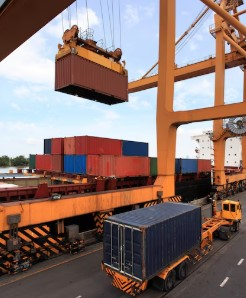
Escalating Tensions: Trump’s Unpredictable Trade Tactics
Negotiating a resolution to these trade disputes has become more challenging due to the unpredictability of Trump's approach. Cecilia Malmström, who previously negotiated trade agreements with the Trump administration's trade representative Robert Lighthizer, observes that discussions in 2025 are proving to be far more difficult than in the past. While previous negotiations had clear trade objectives, Trump's recent tariffs appear to be driven by punitive motives, targeting European industries arbitrarily. Malmström points to Trump's threat of imposing additional tariffs as early as April, which adds another layer of uncertainty for businesses and governments attempting to navigate these trade tensions.
To counteract Trump's aggressive tariff strategy, the EU is investigating legal and economic countermeasures. The European Commission argues that U.S. tariffs violate World Trade Organization (WTO) rules and considers its own tariffs a justified response. The EU is also contemplating activating its Anti-Coercion Instrument, a mechanism developed after China disrupted trade with Lithuania in 2023. If implemented, this legal tool would enable the EU to impose countermeasures such as tariffs, export restrictions, and investment limitations to protect its economic interests. Malmström believes that this instrument may ultimately need to be activated if Trump's trade policies equate to economic coercion.
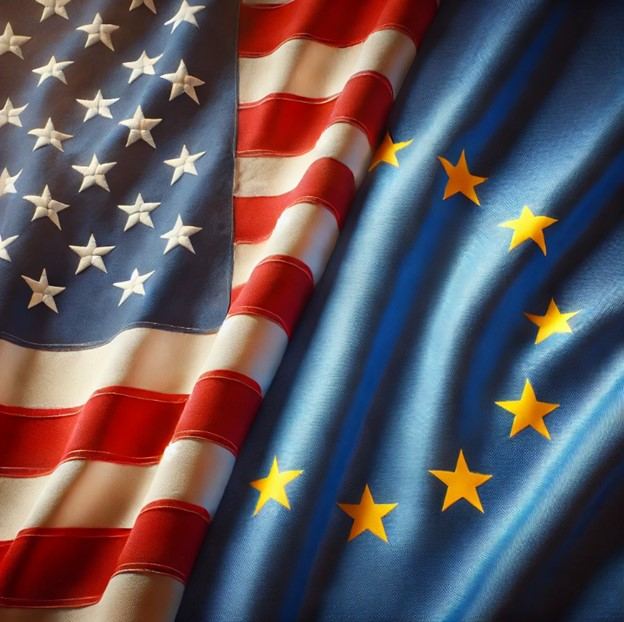
The Future of Transatlantic Trade: Diplomacy or Economic War?
Despite the growing trade conflict, the transatlantic trade relationship remains one of the most significant in the globe. In 2023, total trade in products and services between the U.S. and the EU was valued at €1.6 trillion. While Trump has frequently asserted that the EU sells far more to the U.S. than it buys, the European Commission describes the relationship as balanced, noting that the trade deficit is equivalent to just 3% of total trade. In 2023, the EU exported €503 billion worth of commodities to the U.S., while importing €347 billion. However, the EU maintains a services trade deficit of €109 billion with the U.S., which offsets part of its goods trade surplus.
Malmström remains hopeful that a trade agreement can still be reached despite the ongoing standoff. She contends that the exchange of tariffs is essential for both parties to negotiate from a position of equality. However, she cautions that industries on both sides will be severely impacted by protracted trade disputes. Economic damage will be substantial if tariffs continue to escalate, resulting in disruptions in supply chains, employment losses, and rising prices. Before long-term economic damage becomes inevitable, the EU and U.S. must devise a strategy to deescalate trade tensions.
The economic consequences of the escalating trade conflict between the United States and the European Union are substantial, affecting a variety of industries. The beer industry has emerged as a potential beneficiary, despite the significant challenges that the European spirits and automotive sectors are facing. Negotiations are complicated by Trump's unpredictable trade policies, and European leaders are implementing legal and economic countermeasures as a result. The future of transatlantic trade remains uncertain as both parties continue to exchange tariffs. Diplomacy or protectionism will be the determining factor in the escalating conflict over the next few months.


